2023届高三英语二轮复习:一般现在时课件(25张ppt)
文档属性
| 名称 | 2023届高三英语二轮复习:一般现在时课件(25张ppt) | 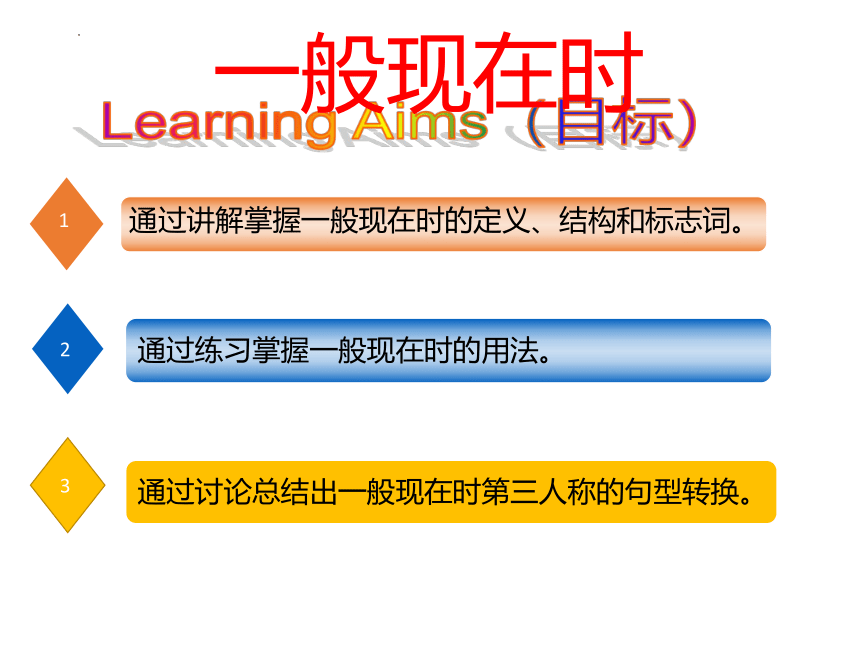 | |
| 格式 | pptx | ||
| 文件大小 | 1.6MB | ||
| 资源类型 | 教案 | ||
| 版本资源 | 通用版 | ||
| 科目 | 英语 | ||
| 更新时间 | 2022-10-08 18:58:07 | ||
图片预览

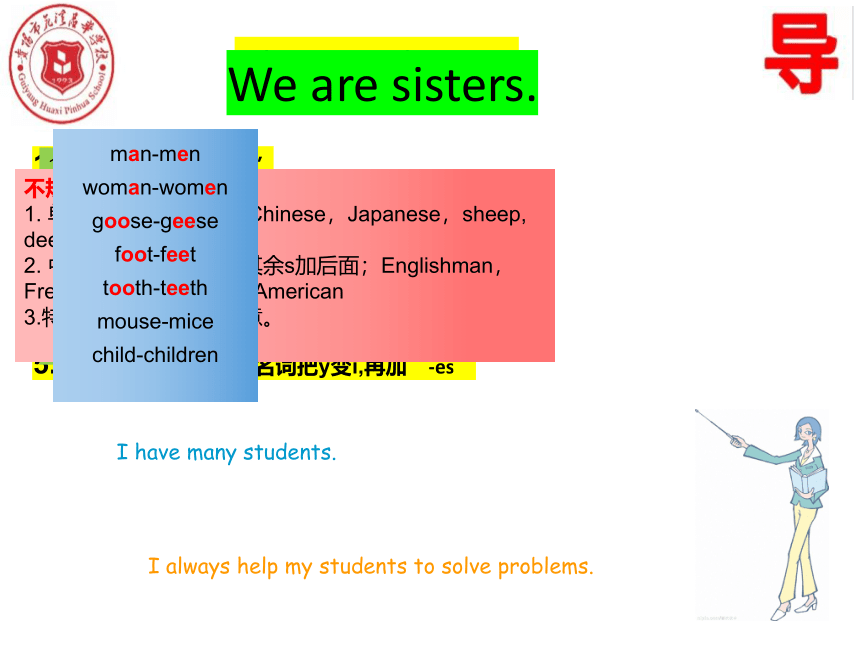
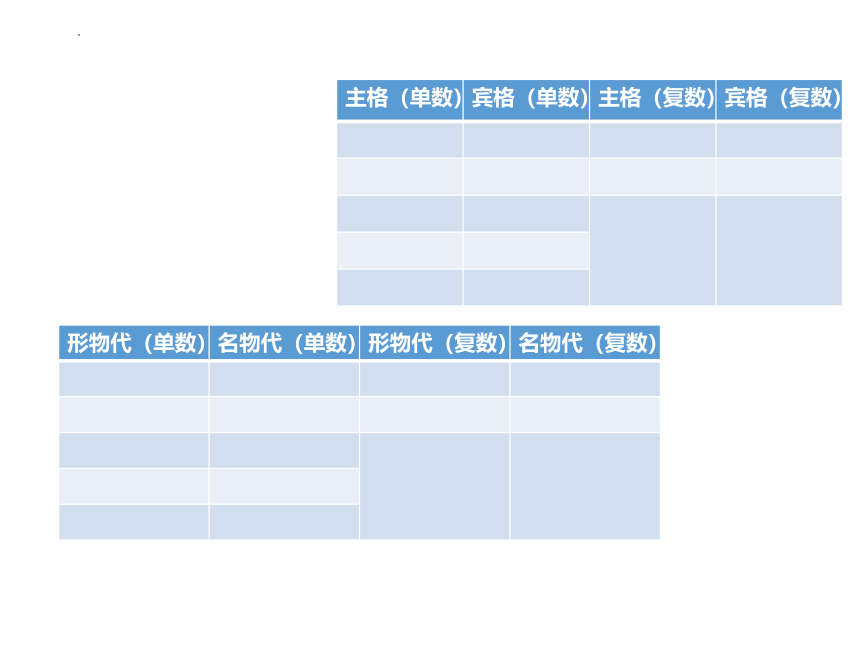
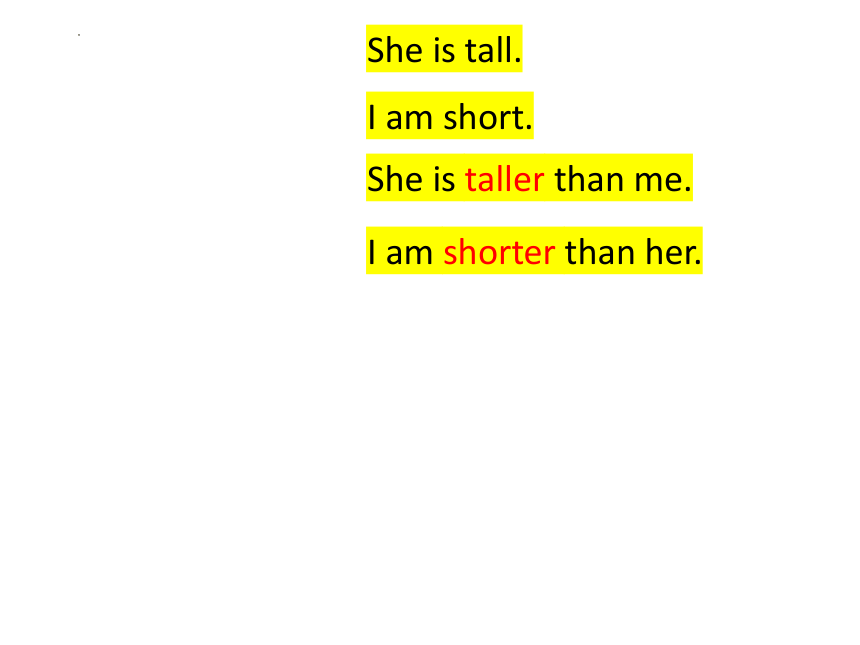

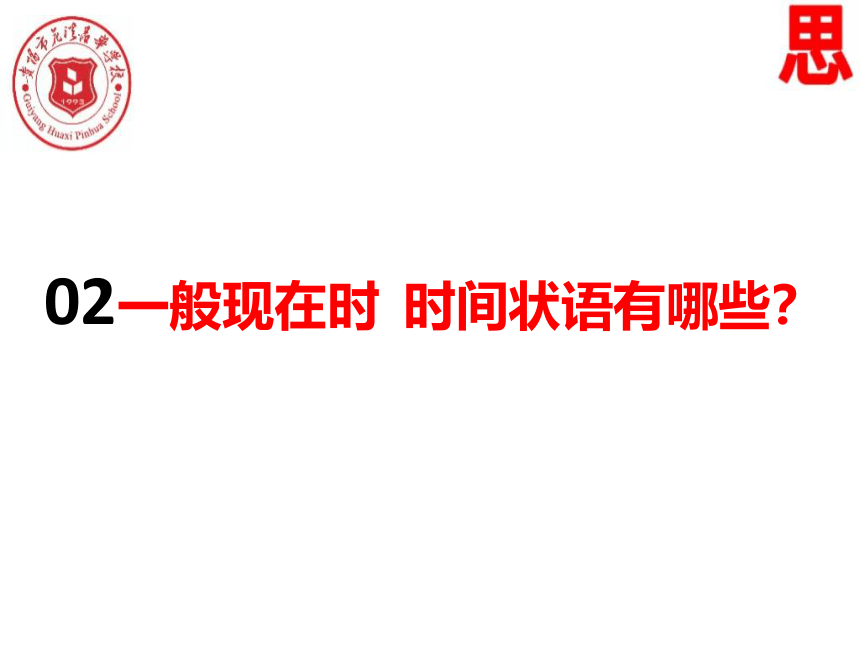
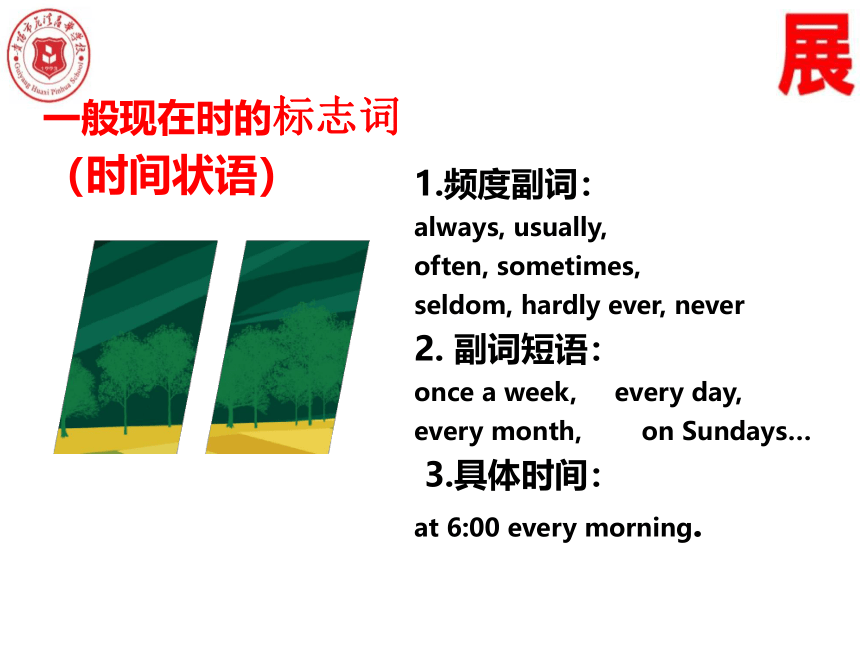
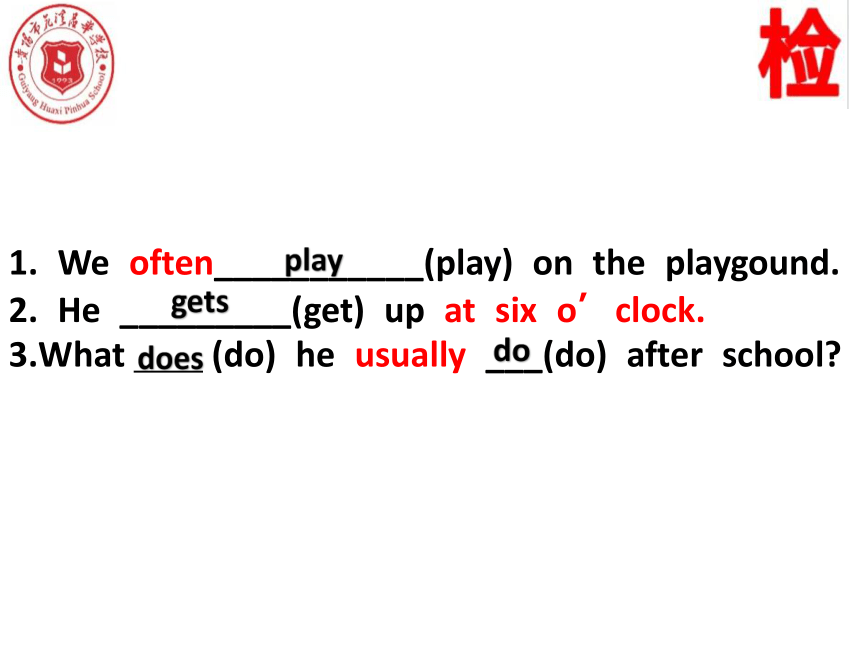
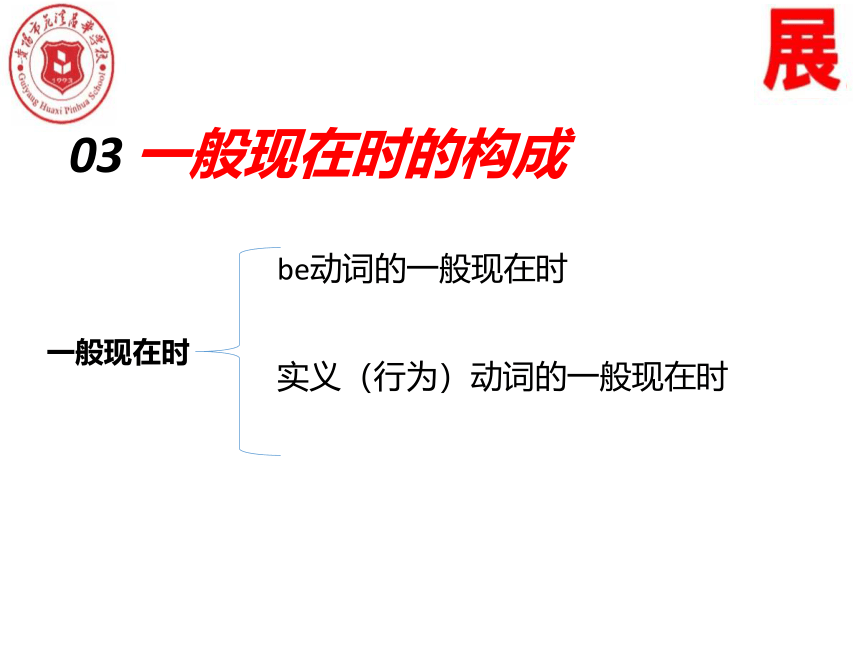
文档简介
(共23张PPT)
1
通过练习掌握一般现在时的用法。
2
通过讲解掌握一般现在时的定义、结构和标志词。
Learning Aims(目标)
3
3
通过讨论总结出一般现在时第三人称的句型转换。
一般现在时
I am a teacher.
I have many students.
I always help my students to solve problems.
She is a dancer.
We are sisters.
1. 一般情况直接加“-s”
2. 以s, x, ch, sh结尾的名词加“-es”
3. 以单个 “o” 结尾的单词,有生命的加 “-es”, 无生命的加 “-s”;以两个 “o” 结尾的单词,加 “-s”
4. 部分以f/fe结尾的名词改f或fe为v,再加“-es”
5. 辅音字母加-y结尾的名词把y变i,再加“-es”
1.desk
2.photo
3.tomato
4.zoo
5.wolf
6.knife
7.family
不规则变化
1. 单复同形:中日鱼羊鹿Chinese,Japanese,sheep, deer, fish;
2. 中日不变,英法变,其余s加后面;Englishman,Frenchman,German,American
3.特殊变化,需要特别注意。
man-men
woman-women
goose-geese
foot-feet
tooth-teeth
mouse-mice
child-children
主格(单数) 宾格(单数) 主格(复数) 宾格(复数)
形物代(单数) 名物代(单数) 形物代(复数) 名物代(复数)
She is tall.
I am short.
She is taller than me.
I am shorter than her.
01概念:
一般现在时表示现在经常反复发生的动作、存在的状态或习惯性的动作的时态。
目前我们常会遇到的三种用法:
1. 客观事实
I am Longyi.
Yangmei is a girl.
2. 符合现在事实情况
Guping is a student.
We are in Yongzhou.
3. 经常、习惯、反复做的事情
We have lunch at 12:30.
We go to school on Monday.
以上的句子都是一般现在时吗?它们有什么特征呢?
02一般现在时 时间状语有哪些?
一般现在时的标志词
(时间状语)
1.频度副词:
always, usually,
often, sometimes,
seldom, hardly ever, never
2. 副词短语:
once a week, every day,
every month, on Sundays…
3.具体时间:
at 6:00 every morning.
1. We often___________(play) on the playgound.
2. He _________(get) up at six o’clock.
3.What (do) he usually ___(do) after school
play
does
gets
do
03 一般现在时的构成
be动词的一般现在时
实义(行为)动词的一般现在时
一般现在时
be 动词的一般现在时:
be:
am, is, are
我用____,
你用_____,
_____ 跟着他她它,
单数____,
复数______。
am
are
is
is
are
1、I the Chinese people
2、it a lot of mice
3、the boy our town
4、they my parents
5、the girls your friend
some milk
6、the news Tom we
7、his little brothers a lovely dog
one of the best writers
用am, is, are填空:
am
are
is
is
is
is
is
is
is
is
is
are
are
are
are
are
are
Task 1
含有be动词句子的句型结构
肯定句: 主语+be动词+其他。
否定句: 主语+be动词+not+其他。
一般疑问句:be动词+主语+其他?
特殊疑问句:特殊疑问词+一般疑问句?
Task 2
把下列句子改成否定句和一般疑问句并作肯定或否定回答。
1、I am in Grade 9.
2、Miss Zhao is our English teacher.
3、These are pears.
4、Singapore is a very interesting
country.
5、Her favorite food is hot dog.
没有be动词,一般现在时怎么用呢?
{
行为动词的一般现在时:
行为动词:表示有实义动作的词语
找出下面的行为动词:
pen come good play go China
have happy read panda
morning do give five live
Task 3
请翻译:我来自中国。
I come from China.
Do you like English
I don’t like English.
肯定/否定回答:
变一般疑问句:
变否定句:
Yes,I do./ No,I don’t
1.人称代词he, she, it用第三人称单数
He often gets up at 6:00 in the morning.
2.单个人名、地名或称呼作主语用第三人称单数。
Peter listens to the radio at 7.a.m.
3. 不定代词someone, somebody, nobody作主语时,用第三人称单数。
Everyone is here.
Part 04
第三人称单数
一般现在时中,主语是第三人称单数时 ,行为动词势单力薄,需要一个帮手(s或es) 。
三、第三人称单数动词变化规则
一般情况下 like—
get--
以 x,s,ch, sh,o 结尾的单词 go—
watch--
以辅音字母加y 结尾的单词 study—
fly--
以元音字母加y结尾的单词 play—
stay--
不规则变化 have—
be--
+s
+es
变y为i加es
+s
likes
gets
goes
watches
studies
flies
plays
stays
has
is
写出下列单词的第三人称单数形式
live------ _________ discuss--- _______
take--- ________ hurry--- ________
go---- ________ wash--- ________
stay-------- ____ be---________
enjoy------ _________ collect---- _______
collects
is
washes
hurries
discusses
enjoys
stays
goes
takes
lives
行为动词的一般现在时的句式:
主语为非第三人称的句式
主语为第三人称的句式
肯定句:
主语(I/We/You/They)+动词+其他
我在周日看电视。
I watch TV on Sunday.
主语(He/She/It)+动词第三人称单现形式+其他
他在周日看电视。
He watches TV on Sunday.
否定句:
主语(I/We/You/They)+do+ not+动词原形+其他
I don’t watch TV on Sunday.
主语(He/She/It)+does +not+动词原形+其他
He doesn’t watch TV at home on Sunday.
主语第三人称单数 动词前加does not (doesn’t)
主语是非单三 动词前加 do not(don’t)
一般疑问句:
Do+主语(I/we/you/they)+动词原形+其他?
Do you watch TV on Sunday
Yes, I do./No, I don’t.
Does+主语(he/she/it)+动词原形+其他?
Does he watch TV on Sunday
Yes, he does./No, he doesn’t.
在主语前用助动词do或does,谓语动词为原形。
Task 4
用所给动词的适当形式填空:
1. He________ TV every evening. (watch)
2. We always ________ to school on foot. (go)
3. John ________ like his father. (look)
4.Tom and his classmates often ______ football after school.
(play)
5.Your shoes _______ under the bed. (be)
6. His aunt usually _________ housework at home. (do)
7. I always ______ up at six in the morning.(get)
watches
go
looks
play
are
does
get
谢谢聆听!
Thank you!
1
通过练习掌握一般现在时的用法。
2
通过讲解掌握一般现在时的定义、结构和标志词。
Learning Aims(目标)
3
3
通过讨论总结出一般现在时第三人称的句型转换。
一般现在时
I am a teacher.
I have many students.
I always help my students to solve problems.
She is a dancer.
We are sisters.
1. 一般情况直接加“-s”
2. 以s, x, ch, sh结尾的名词加“-es”
3. 以单个 “o” 结尾的单词,有生命的加 “-es”, 无生命的加 “-s”;以两个 “o” 结尾的单词,加 “-s”
4. 部分以f/fe结尾的名词改f或fe为v,再加“-es”
5. 辅音字母加-y结尾的名词把y变i,再加“-es”
1.desk
2.photo
3.tomato
4.zoo
5.wolf
6.knife
7.family
不规则变化
1. 单复同形:中日鱼羊鹿Chinese,Japanese,sheep, deer, fish;
2. 中日不变,英法变,其余s加后面;Englishman,Frenchman,German,American
3.特殊变化,需要特别注意。
man-men
woman-women
goose-geese
foot-feet
tooth-teeth
mouse-mice
child-children
主格(单数) 宾格(单数) 主格(复数) 宾格(复数)
形物代(单数) 名物代(单数) 形物代(复数) 名物代(复数)
She is tall.
I am short.
She is taller than me.
I am shorter than her.
01概念:
一般现在时表示现在经常反复发生的动作、存在的状态或习惯性的动作的时态。
目前我们常会遇到的三种用法:
1. 客观事实
I am Longyi.
Yangmei is a girl.
2. 符合现在事实情况
Guping is a student.
We are in Yongzhou.
3. 经常、习惯、反复做的事情
We have lunch at 12:30.
We go to school on Monday.
以上的句子都是一般现在时吗?它们有什么特征呢?
02一般现在时 时间状语有哪些?
一般现在时的标志词
(时间状语)
1.频度副词:
always, usually,
often, sometimes,
seldom, hardly ever, never
2. 副词短语:
once a week, every day,
every month, on Sundays…
3.具体时间:
at 6:00 every morning.
1. We often___________(play) on the playgound.
2. He _________(get) up at six o’clock.
3.What (do) he usually ___(do) after school
play
does
gets
do
03 一般现在时的构成
be动词的一般现在时
实义(行为)动词的一般现在时
一般现在时
be 动词的一般现在时:
be:
am, is, are
我用____,
你用_____,
_____ 跟着他她它,
单数____,
复数______。
am
are
is
is
are
1、I the Chinese people
2、it a lot of mice
3、the boy our town
4、they my parents
5、the girls your friend
some milk
6、the news Tom we
7、his little brothers a lovely dog
one of the best writers
用am, is, are填空:
am
are
is
is
is
is
is
is
is
is
is
are
are
are
are
are
are
Task 1
含有be动词句子的句型结构
肯定句: 主语+be动词+其他。
否定句: 主语+be动词+not+其他。
一般疑问句:be动词+主语+其他?
特殊疑问句:特殊疑问词+一般疑问句?
Task 2
把下列句子改成否定句和一般疑问句并作肯定或否定回答。
1、I am in Grade 9.
2、Miss Zhao is our English teacher.
3、These are pears.
4、Singapore is a very interesting
country.
5、Her favorite food is hot dog.
没有be动词,一般现在时怎么用呢?
{
行为动词的一般现在时:
行为动词:表示有实义动作的词语
找出下面的行为动词:
pen come good play go China
have happy read panda
morning do give five live
Task 3
请翻译:我来自中国。
I come from China.
Do you like English
I don’t like English.
肯定/否定回答:
变一般疑问句:
变否定句:
Yes,I do./ No,I don’t
1.人称代词he, she, it用第三人称单数
He often gets up at 6:00 in the morning.
2.单个人名、地名或称呼作主语用第三人称单数。
Peter listens to the radio at 7.a.m.
3. 不定代词someone, somebody, nobody作主语时,用第三人称单数。
Everyone is here.
Part 04
第三人称单数
一般现在时中,主语是第三人称单数时 ,行为动词势单力薄,需要一个帮手(s或es) 。
三、第三人称单数动词变化规则
一般情况下 like—
get--
以 x,s,ch, sh,o 结尾的单词 go—
watch--
以辅音字母加y 结尾的单词 study—
fly--
以元音字母加y结尾的单词 play—
stay--
不规则变化 have—
be--
+s
+es
变y为i加es
+s
likes
gets
goes
watches
studies
flies
plays
stays
has
is
写出下列单词的第三人称单数形式
live------ _________ discuss--- _______
take--- ________ hurry--- ________
go---- ________ wash--- ________
stay-------- ____ be---________
enjoy------ _________ collect---- _______
collects
is
washes
hurries
discusses
enjoys
stays
goes
takes
lives
行为动词的一般现在时的句式:
主语为非第三人称的句式
主语为第三人称的句式
肯定句:
主语(I/We/You/They)+动词+其他
我在周日看电视。
I watch TV on Sunday.
主语(He/She/It)+动词第三人称单现形式+其他
他在周日看电视。
He watches TV on Sunday.
否定句:
主语(I/We/You/They)+do+ not+动词原形+其他
I don’t watch TV on Sunday.
主语(He/She/It)+does +not+动词原形+其他
He doesn’t watch TV at home on Sunday.
主语第三人称单数 动词前加does not (doesn’t)
主语是非单三 动词前加 do not(don’t)
一般疑问句:
Do+主语(I/we/you/they)+动词原形+其他?
Do you watch TV on Sunday
Yes, I do./No, I don’t.
Does+主语(he/she/it)+动词原形+其他?
Does he watch TV on Sunday
Yes, he does./No, he doesn’t.
在主语前用助动词do或does,谓语动词为原形。
Task 4
用所给动词的适当形式填空:
1. He________ TV every evening. (watch)
2. We always ________ to school on foot. (go)
3. John ________ like his father. (look)
4.Tom and his classmates often ______ football after school.
(play)
5.Your shoes _______ under the bed. (be)
6. His aunt usually _________ housework at home. (do)
7. I always ______ up at six in the morning.(get)
watches
go
looks
play
are
does
get
谢谢聆听!
Thank you!
